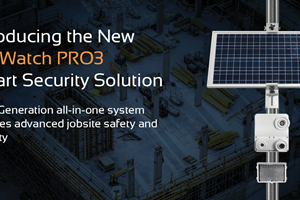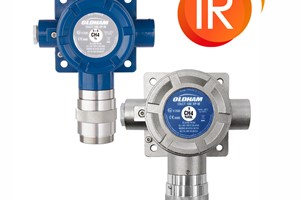The new vision for intelligent surveillance cameras
Video surveillance technology has come a long way over the past few decades, evolving into the intelligent network system endpoints they are today. Given our increasingly high expectations for HD quality on all video devices we use, it is hard to comprehend that security professionals were once happy to capture grainy black and white images from cameras employing primitive tube technology. Not only can today’s professional surveillance cameras capture color images in near darkness and changing light conditions, they’re also exceptionally smart devices capable of capturing a wide range of useful data.
Artificial Intelligence (AI) Is a Game Changer
New next generation video surveillance cameras with AI-driven video analytics at the edge are elevating mainstream imaging to an entirely new level. By employing advanced processing engines and embedded software, these intelligent new imaging devices can autonomously detect changes in scenes that may otherwise go unnoticed in systems with large numbers of cameras. To ensure they capture the highest quality video possible, these intelligent devices also automatically adjust the settings of the scenes being analyzed, which increases their capacity to detect, analyze and provide new sources of data. This data-rich video effectively increases overall safety and security with new benchmarks in performance, cost efficiency and effectiveness.
Perhaps the most significant advantage of new AI-driven imaging devices is in their ability to transform traditional video surveillance systems from being reactive to proactive security solutions. The ability to alert security personnel of a possible threat or abnormal activity while an event is unfolding allows them the opportunity to prevent potentially harmful events from occurring or further escalating.
This new generation of AI-powered video surveillance cameras delivers numerous intelligent features, most of which were only possible using expensive centralized software solutions requiring complex integrations. Some of the most highly desired AI-driven features/benefits that are now available in high-end video surveillance imaging solutions include the following capabilities:
- Advanced video motion detection (VMD) is a powerful feature to help detect suspicious activities such as loitering, cross line and movement direction. These advanced motion-detection settings can better protect critical locations and be applied to a vast number of applications including: ATM/banking surveillance, mass transportation, retail/mall surveillance, manufacturing and more. VMD can also help eliminate the high cost and wasted time it takes security personnel to investigate and rectify false alarms caused by common anomalies like shadows, small animals, swaying trees and plants, reflections and weather-related events.
- Detection, differentiation and identification of faces, humans, vehicles and motorcycles/bicycles facilitate real-time identification and authentication of the subject matter. This enables security personnel to respond quickly and in the most appropriate manner to unfolding events.
- Pixilation of faces and/or human figures protects personal identities captured in scenes of interest in wide-area surveillance. This ensures privacy protection when disseminating video to aid in the search for wanted individuals or when video footage is used for forensic evidence in court. This also saves tremendous amounts of security and law enforcement personnel time from manually redacting facial images in order to best comply with the Freedom of Information Act.
- Auto adjustment of image settings, including shutter speed, auto exposure, gamma correction, and noise reduction, ensures that these intelligent cameras are always optimized to capture the highest quality images. This also increases the amount and level of metadata that can be extracted for analysis and search functions.
- Smart coding automatically adjusts video compression to help conserve bandwidth and minimize storage requirements. This allows the surveillance cameras to operate more efficiently in the background with the ability shift to low compression modes during triggered events or predetermined intervals.
- Sound classification can also be programmed to set alarms for targeted sounds like gunshots, screams or breaking glass to detect action that may be occurring outside of a camera’s field of view
The Rise of Business Intelligence
One of the most significant operational benefits provided by new AI-driven surveillance cameras is in their ability to provide new sources of data for business intelligence (BI) applications. For example, VMD features, like cross line and object direction detection, can be easily deployed in manufacturing environments to detect potentially dangerous situations around production lines. They can also ensure that areas with power generation and HVAC equipment, or data centers and other high security areas, are not breached. Smart facial recognition solutions with privacy-protection pixilation capabilities can also be used to locate missing children in busy airport terminals or shopping malls or by municipalities to locate senior citizen elopements. The applications for these powerful features are virtually unlimited for BI applications across the enterprise.
The ability to upload third-party applications further adds to the versatility of these powerful intelligent imaging devices. New video surveillance cameras with built-in AI processors provide powerful edge-computing capabilities that allow system integrators to further customize these versatile endpoints for numerous applications. For ease of deployment and added cost savings, many third-party applications can be installed without a cloud- or server-based connection, which is ideal for systems with distributed architecture and remote camera locations.
As a result of their outstanding imaging performance and versatility, AI-driven video surveillance cameras will play an increasingly important role in the continued advancement of physical security system technology, as well as new and emerging BI and health-safety applications
By Adam Lowenstein
Director of product management at Panasonic i-PRO Sensing Solutions Corp. of America.













